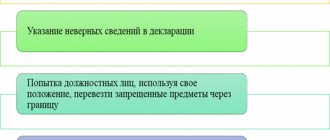Sometimes a person fails to steal some property. What are such actions of a person, what punishment awaits him for this, as well as how to protect himself in such situations, you will find answers to these and other questions below.
ATTENTION : our Ekaterinburg theft lawyer will help you understand the elements of attempted theft: professionally, on favorable terms and on time. Call today
What is unfinished theft?
An unfinished theft refers to the actions of a person to commit a given crime, which were not completed, as a rule, due to circumstances beyond the control of the person, namely, his actions were stopped, i.e. stopped or he was unable to complete his plans for some other reason.
The incompleteness of the theft is expressed in the fact that the victim is not actually harmed, because the item of theft does not leave the owner's possession.
An unfinished theft will be qualified through Part 3 of Article 30 of the Criminal Code of the Russian Federation, i.e. like attempted theft.
Size
The criminal law provides:
- Theft (over 2500 rubles).
- Theft causing significant damage (at least 5,000 rubles).
- Grand theft (over 250 thousand rubles).
- Theft on an especially large scale (over 1 million rubles).
The qualified corpus delicti of theft is theft on a large and especially large scale.
In large and especially large sizes, how much is this? According to the note to Article 158 of the Criminal Code of the Russian Federation, a large amount of stolen property will be recognized as having a value of over 250 thousand rubles, and an especially large amount - over 1 million rubles.
Punishment for attempted theft
When assigning punishment for attempted theft, the person’s failure to complete his criminal intent will be taken into account.
The court will have to be guided by the rules for imposing punishment for an attempt, provided for in Part 3 of Article 66 of the Criminal Code of the Russian Federation, the provisions of which state that the term and amount of punishment in this case should not exceed ¾ of the maximum term or amount of the most severe type of punishment under the relevant article. The article's sanctions for theft provide for punishment for completed crimes, and if the crime is not completed, then the maximum punishment cannot be imposed.
It is worth considering that if a criminal act is committed by a person for the first time and it is characterized positively, then even if the crime is completed, the courts, as a rule, do not impose the most severe punishment on the defendant, and certainly no severe punishment should be imposed for an attempt under such circumstances.
Of course, the court will also take into account mitigating and aggravating circumstances in the case, if any. If there is such a mitigating circumstance as confession, and the absence of aggravating circumstances, the punishment should be imposed according to the rules of Article 62 of the Criminal Code of the Russian Federation, i.e. not exceed 2/3 of the maximum sentence.
At what point is it considered completed?
Theft is a material crime. That is, criminal liability for a completed crime occurs if all the signs of the objective side are contained: the action, socially dangerous consequences and the cause-and-effect relationship between them. Therefore, the moment the theft ends is associated with the onset of socially dangerous consequences, which are expressed in causing damage to the owner of the stolen property. From this moment the theft is considered complete.
Important!
The Supreme Court in paragraph 6 of PPVS No. 29 indicates that the theft is considered completed from the moment the person has a real opportunity to dispose of or use the property.
If a person has completed all the steps to steal property, but does not have the opportunity to use it, then one cannot speak of a completed theft.
Here are two examples:
- Ivan steals property from Peter's apartment while he is not at home.
After confiscating the stolen property, Ivan calmly leaves the apartment building and freely gets to his own, where he gives part of the stolen property to his wife and keeps part for himself.After this, he is detained by law enforcement agencies.
In this situation, Ivan has a real opportunity to use Peter’s property at his own discretion, so the crime will be considered completed.
- Ivan performs the same actions.
However, when leaving Peter's apartment, he is detained by the police. In this situation, Ivan, although he stole the property, was unable to sell it as he had originally planned, that is, there was no real opportunity to use it. In other words, when the culprit is at the scene of the theft, he cannot dispose of the stolen property. This opportunity arises when a person leaves the scene of a crime.
In practice, it is very important to be able to distinguish between completed and unfinished theft, which we will talk about later.
Recommended reading:
What is theft? Understanding the concept and key features
Where to go if there is a theft?
Criminal legal characteristics of theft. Corpus delicti
Mitigation or exemption from punishment for attempted theft
► Mitigation of punishment is possible if there are appropriate circumstances provided for by law, namely:
- if the crime was committed by a minor;
- if the defendant is pregnant;
- if the guilty person has young children;
- if the defendant decided to commit a crime due to difficult life circumstances;
- if a person was forced to commit a crime;
- if the person wrote a confession and actively contributed to the detection and investigation of the crime.
Provided by law as a mitigating circumstance, the commission of a crime for the first time of minor or moderate gravity, due to a random combination of circumstances. However, in this case, all conditions must be met, including the presence of a random coincidence of circumstances. What kind of random coincidence of circumstances could there be during theft, is that a question?
IMPORTANT : the court may also take into account other mitigating circumstances.
► A person may be released from punishment on the following grounds:
- if after committing a crime he has a mental disorder due to which he does not realize what he is doing;
- if he falls ill with a serious illness that does not allow him to serve his sentence.
The Criminal Code of the Russian Federation also provides other grounds for exemption from punishment, but it is unlikely that the corresponding grounds are applicable to the crime under consideration.
INTERESTING : in addition, do not forget, if you are not guilty, read how to prove your innocence using the link, and also watch a video on the topic
Features of dismissal and assignment of responsibility when theft is detected
Money from the cash register
If you detect the disappearance of funds from the company's cash register, follow the instructions below. You need:
- issue an order to withdraw cash from the cash register and identify the missing amount;
- conduct an inventory of property;
- ask for an explanation from the cashier;
- contact the police.
Director of LLC
Theft is the appropriation of SOMEONE else's property. Material assets owned by an LLC are not the property of the founder and director. This means that if a director embezzles from an enterprise, he can be held accountable. This requires a statement from the injured party and identification of all the elements of the crime.
Problems arise with such an element of composition as the subjective side. It is difficult to prove that the director of a company has a selfish goal and a desire to cause material damage to his own company. However, if there are facts about the illegal withdrawal of funds and personal enrichment, directors are successfully brought to justice for official theft.
You can learn more about the elements of the crime of theft here.
How to defend yourself when accused of attempted theft?
The defense against charges of attempted theft will depend on what the investigative authorities base the charge on. The investigator in a criminal case must prove that the person had intent to commit theft, that the person was unable to complete his plan due to circumstances that did not depend on him, i.e. his actions were stopped by a third party, perhaps even the victim, or other circumstances arose that prevented him from committing the theft.
But it may be that the person did not actually intend to commit theft and, accordingly, did not try to commit it, but they thought that he wanted to steal. It is difficult to say how to behave in this case, since situations can be different, for example, they decided to play a joke on a person and threw some object into his bag in a store. In this case, when an item in a bag in a store is triggered by a system indicating that the item has not been paid for, the person must behave calmly, comply with all security requirements, and show the contents of his bag.
When the item is discovered, the suspect must explain that he did not take the item and does not know how it ended up in the bag, and should be asked to immediately check the CCTV footage.
Voluntary refusal to commit
There are situations when a person has already begun to prepare to commit theft or has already begun to commit theft, but has decided to refuse further execution of the objective party.
For example, A. planned to steal equipment from apartment B. He made his way into the living space, but subsequently decided not to steal anything, because he was afraid that he would be prosecuted.
In this case, A. will be held accountable only for the actual actions (Part 3 of Article 31 of the Criminal Code of the Russian Federation) that he committed, that is, for illegal entry into residential premises - Part 1 of Art. 139 of the Criminal Code of the Russian Federation.
However, the person will not be held criminally liable for theft, since there was a voluntary refusal.
To recognize a refusal to commit theft as voluntary, the following conditions are necessary:
- Timeliness of refusal.
That is, he can only be at the stage of preparation or attempted theft.
If A. has already stolen the equipment, left the house with it, but then could not sell it, then this is already a completed theft, therefore, there cannot be a voluntary refusal.
- Finality of refusal.
That is, the person must finally refuse to commit theft.
If A. decided not to steal from the apartment that day, but returned the next day, then in this situation we cannot talk about the voluntariness of the refusal.
- A real opportunity to commit theft.
That is, the guilty person understands that he can perform all the actions to steal the property and escape with it. However, he does not do this because he does not want to be punished.
We cannot talk about voluntary refusal if A. was caught by the owner of the apartment at the scene of the theft.
- Voluntary refusal.
That is, the guilty person must independently decide not to commit theft.
A. was caught at the scene of the theft by law enforcement agencies, then we are talking about a forced refusal.
Thus, if all of the above conditions are present, then the person cannot be brought to criminal liability in accordance with Art. 31 of the Criminal Code of the Russian Federation.
Rights of the victim in case of unfinished theft
The victim, as a participant in criminal proceedings, has his procedural rights provided for in Article 42 of the Code of Criminal Procedure of the Russian Federation, regardless of whether the crime was completed or not, i.e. he has the right to get acquainted with the case materials, file petitions, participate in court proceedings, etc.
In addition, if the victim, in connection with the attempted theft by the defendant, suffered moral damage, he has the right to file a claim for compensation for such damage by the defendant.
In addition, the victim has the right to reconcile with the defendant, and in this case the defendant may be released from criminal liability.
USEFUL : for more information about protecting the victim, follow the link, and also watch the video from YouTube
Regardless of whether a person wanted to commit a crime or did nothing at all, and he is charged, both will need the help of a lawyer. In the event of an attempt to commit theft, the lawyer will tell you how to behave, what actions can be taken so that the punishment is as lenient as possible, and if an unfounded accusation is brought, then it will be necessary to investigate and prove that the person did not try to commit the crime that he is charged with.
Our lawyers in such cases have extensive experience, which plays an important role in choosing the right tactics to protect the accused and defendants.
If you are accused of theft at your place of work, what to do and where to go
When a person believes that he is unfairly suspected of theft, he should raise the issue with the employer about a detailed investigation of the incident. You should also provide your written explanations on the merits of the charges brought against you.
You must send your arguments by registered mail with a list of attachments. In this case, it will be more likely that they will be taken into account in the future when investigating a crime for theft in the workplace.
You should also consult with a lawyer regarding your situation. He will suggest a line of conduct with the administration of the enterprise. In addition, a lawyer can negotiate a conflict with the company where the citizen is employed.
It is also important for the employee to study all documents signed with the employer. This includes an employment contract, an agreement on full financial responsibility, and a job description. It is quite possible that their points will help build a line of defense.
We emphasize that in any case it is important to convey in writing to the company’s management your position regarding the claims being made.
Accomplices
Any persons who know about a crime being prepared or committed, who do not report it and contribute to its commission /sale of stolen goods, are subject to criminal charges if:
- take stolen items for storage;
- help in their transportation;
- use the stolen goods for themselves;
- sell stolen items;
- agree with the criminal group on the above points.
All of the above actions are considered participation in theft only if evidence is found.
If the organizer, instigator or accomplice did not directly participate in the theft of someone else's property, the crime committed by the perpetrator cannot be qualified as committed by a group of persons by prior conspiracy. In these cases, by virtue of part three of Article 34 of the Criminal Code of the Russian Federation, the actions of the organizer, instigator or accomplice should be qualified with reference to Article 33 of the Criminal Code of the Russian Federation. The responsibility of the participants in the crime will be determined by the nature and extent of each person’s actual participation in the theft.
What else can be called burglary?
Not in a legal environment, burglary can be called acts falling under Art. 161 of the Criminal Code of the Russian Federation “Robbery” and Art. 162 of the Criminal Code of the Russian Federation “Robbery”.
The difference with theft is as follows:
- Robbery is the open theft of property.
- Robbery is an attack with the aim of stealing property.
The specified norms provide for much more tangible liability for these crimes involving unlawful entry into a storage facility or home.
You will have to answer for robbery with penetration under paragraph “c” of Part 2 of Article 161 of the Criminal Code of the Russian Federation. It is realistic to receive up to five years of forced labor or up to seven years of imprisonment.
Robbery with penetration is punishable by the third part of Article 162 of the Criminal Code of the Russian Federation, for which the offender can be imprisoned for a term ranging from 7 to 12 years. For these acts, an additional fine or restriction of freedom may be imposed.
Punishment, examples of judicial practice
As already mentioned above, these acts are regulated by Part 2/3/4 Art. 158 of the Criminal Code of the Russian Federation. Each part is characterized by its own set of signs and, accordingly, the severity of the punishment:
- Part 2 158 of the Criminal Code of the Russian Federation is a theft committed:
- by a group of persons by prior conspiracy;
- with illegal entry into the premises or other storage;
- causing significant damage to a citizen;
- from clothes, a bag or other hand luggage that was with the victim.
Provides for the following types of punishment:
- imposing a fine of up to 200,000 rubles. or in the amount of the convicted person’s income for an 18-month period;
- compulsory work up to 480 hours;
- correctional labor for up to 2 years;
- forced labor for up to 5 years, with possible restriction of freedom;
- imprisonment for up to 5 years.
Example No. 1
Two young men, having previously discussed their actions with each other, decide to encroach on the warehouse of one of the subsidiary enterprises, breaking the padlock and cutting the electrical wiring of the warehouse in which bags of cement were stored with a total value of 5,100 rubles. Accordingly, these acts are typical for Part 2 of Art. 158 of the Criminal Code of the Russian Federation, and when hearing the case, the court will take into account the amount of damage caused, which will consist of the cost of the stolen items and the cost of damaged locks and electrical wiring.
Punishment for committing such a crime, based on the experience of judicial practice, will most likely consist of full repayment of the amount of damage caused and, if there is a confession and assistance in the investigation, compulsory labor.
- Part 3 158 of the Criminal Code of the Russian Federation - theft, which was carried out:
- with illegal entry into a home;
- from an oil pipeline, oil product pipeline, gas pipeline;
- on a large scale - more than 250,000 rubles, but less than 1,000,000 rubles.
Also read: What is petty theft and up to what amount is it considered petty?
Is as follows:
- fine from 100,000 to 500,000 rubles. or in the amount of income for a period of no more than 3 years;
- forced labor for up to 5 years, with possible restriction of freedom for up to 1.5 years;
- imprisonment for up to 6 years with a fine of up to 80,000 or in the amount of income for a 6-month period and restriction of freedom for up to 1.5 years.
Example No. 2
A certain Ivanov I.I., living in a small town, fully understanding that his actions would be interpreted as illegal, entered the house (dacha) of the Victim, who was not at home, breaking down the door. From the house Ivanov I.I. took out and loaded the Victim’s property into the car: a TV, a laptop, a TV set-top box. The defendant stole a boiler from a building that served as a boiler room. After the stolen property was loaded into the car, the criminal fled the crime scene. According to the results of the examination, the total amount of stolen goods was 71,000 rubles.
Ivanov I.I. fully admitted his guilt. The court, having considered all the evidence presented, as well as the positive characteristics and confessions of the defendant, passed the sentence provided for in paragraph “a” of Part 3 of Art. 158, in the form of imprisonment for 2 years and 6 months. But the provisions of Art. 73 of the Criminal Code of the Russian Federation, and this period exceeded the conditional period, with a probationary period of 2 years.
Part 4 158 of the Criminal Code of the Russian Federation. Signs include:
- theft committed by an organized group;
- in an especially large amount - more than 1,000,000 rubles.
Imprisonment for up to 10 years with a fine of up to 1,000,000 rubles is provided. or in the amount of income for a 5-year period, with possible restriction of freedom for up to 2 years.
Example No. 3
A certain citizen, for example, Artyomov A.A., who lives in the same house with the Victim, having seen that the Victim had left her apartment, having forgotten to slam the front door, decided to take advantage of the moment and enter the residential premises in order to commit theft, knowing about the material security of the family living there. Artyomov A.A. opened the lock on the second door and entered the apartment. As a result of the theft, the defendant caused damage to the Victim in the amount of 1,010,001 rubles, which was proven based on the results of the conclusion. Artyomov A.A., realizing that he is in danger, agrees with all the accusations and in every possible way contributes to the progress of the investigation, and therefore the stolen property was eventually returned to the Victim.
As a result, the court sentenced: A. A. Artyomov was found guilty under paragraph “b” of Part 4 of 158 of the Criminal Code of the Russian Federation with imprisonment for a term of 3 years, without charging a fine or restriction of freedom. And on the basis of Article 73 of the Criminal Code of the Russian Federation, the court decided to consider the term suspended with a similar probationary period.
From these examples it is clear that the punishment was mainly conditional, since the degree of public danger in both cases was minimal, and the defendants did their best to assist the investigation. Otherwise the punishment would have been much more severe.
To summarize, it is worth repeating that there is no general punishment that was applied to the type of crime in question, since the very concept of “burglary” is absent in the Criminal Code. The degree and severity of the punishment will depend on many related factors, the main one of which is the amount of damage caused, and the fact of hacking itself is considered as an aggravating circumstance.







